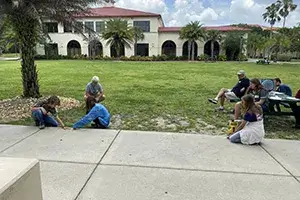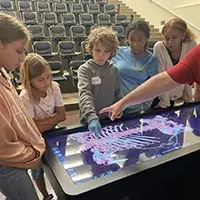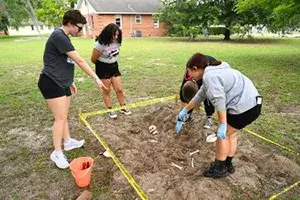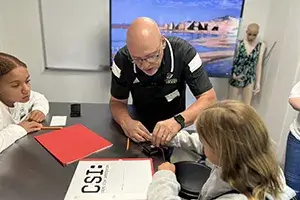“That looks suspicious.” Hernando County (FL) middle and high school students were saying just that as they scrutinized clues while exploring the world of crime scene investigation through CSI Summer Camps at Saint Leo University.
The Hernando County School District has offered summer camps throughout its schools for the past two years. Now based on grant funding available through the Elementary & Secondary School Emergency Relief Fund (ESSER), “we were able to expand those opportunities to include off-site camps, including the CSI forensic camps at Saint Leo,” said Beth Lastra, supervisor of College and Career Programs for the district.
As students returned to the classroom following COVID-19 lockdowns, “we wanted to create opportunities for students to explore careers through hands-on activities,” Lastra said. “By exposing them to a wide range of career options, these activities help students discover their interests and strengths.”
Saint Leo University first began holding CSI Summer Camp in 2018, which were open to the public. This year’s camps were developed for the Hernando district and were geared toward different grade levels. For example, Saint Leo’s criminal justice and public safety administration faculty members added a scavenger hunt for the middle school-age students at the camp held June 5 - 8, which incorporated many of the classroom and outside-the-classroom learning activities, said Dr. Joseph Cillo, assistant professor of criminal justice.
Campers learned how to: measure, sketch, and photograph crime scenes; make foot and tire tread impressions; understand the importance of fingerprints and lift them properly;
collect evidence; dig up and examine human remains; and identify types of bugs found on scenes and bodies. In addition, the Hernando County students learned what types of information they would need to provide during court testimony, and they had the opportunity to view a demonstration of the university’s anatomage table, which provides an advanced 3D visualization of the body and is a virtual dissection tool.
Saint Leo’s Crime Scene House was the setting for some of the experiential learning including fingerprinting lessons. Outside, the campers took note of their surroundings and found an area with freshly dug dirt.
“What do you notice?” asked camp instructor Cassie Heister during the high school camp held June 26 - 29. “Freshly turned dirt. That definitely is suspicious.”
The campers said they saw a bone, and Heister, a senior who is studying forensic science at Long Island University, added that the dirt was lower and there were no plants growing around it. She coached the students on the proper use of hand shovels and brushes in excavating the site.
“You would look at that bone and say, ‘That looks suspicious,’” Heister said, and encouraged the campers to “get all up in there” to retrieve any bones.
“These two bones are leg bones,” she said. “These are good for figuring out how tall someone is.”
Andrea Santana of Nature Coast Technical High School, Ayami Gomez of Hernando High School, and Jeslyn Hawk of Central High School, kept at their task of digging and brushing the dirt off of anything they spotted that might be a bone — or something that might be related to a crime.
“That is a pelvis,” Heister told the young women as they gingerly retrieved a bone. “What is the pelvis good to tell you [about the person or animal whose remains were found].
“Whether it’s female or male,” Hawk said.
In the past, females’ hips were wider in order to give birth, Heister noted. Now, bodies have evolved because of cesarean sections, but if skeletal remains have a wider pelvic bone, the first thought is that it is a female.
While the trio were digging outside, other campers were working with Saint Leo criminal justice faculty members inside the Crime Scene House learning about bodily fluids and bugs and another group was searching and photographing the campus grounds. Each group had the opportunity to participate in all of the CSI events.
“Through hands-on activities, our camps allow students to engage in practical problem-solving, critical thinking, and decision-making, which are essential skills in any profession,” Hernando County’s Lastra said.
“It empowers them to explore their potential, experiment with different roles, and develop a clearer sense of their career aspirations. When students are enthusiastic about their chosen field, they are more likely to be dedicated, driven, and successful in their academic and professional pursuits.”




